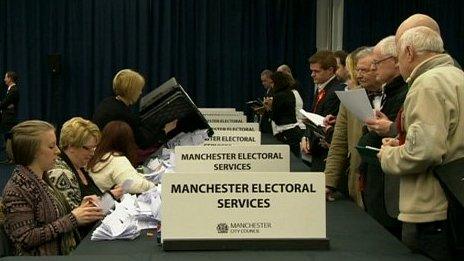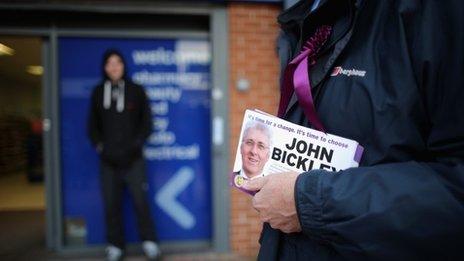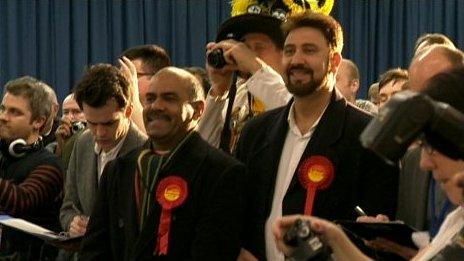Wythenshawe and Sale East by-election: What have we learned?
- Published
Michael Kane paid tribute to Paul Goggins in his speech
Extrapolating wildly from any one by-election to make predictions about the health of political parties nationally is often overdone.
But it doesn't stop the parties having a crack at it, nor the pundits either.
Why? Well, opinion polls come and go, but while any by-election is just a tiny slice of the electorate in one of 650 seats across the UK, it does involve real votes in real ballot boxes.
So, what can we read into the Wythenshawe and Sale East by-election?
Well, a few more caveats first.
It has long been a safe Labour seat and it still is.
And at by-elections, voters are not choosing a government - they can shout loudly and protest, safe in the knowledge that it won't change the person who lives in Downing Street.
UKIP cutting through
But what we can conclude from this latest by-election, the 17th since the 2010 general election, is that in one corner of Greater Manchester two trends that have happened in several other contests were repeated.
To start with, the UK Independence Party finished second.

Yes, it was merely the best of the rest, well behind Labour.
But last time here UKIP finished fifth, behind the British National Party.
This time it managed 17.9% of the vote.
It is the sixth by-election since 2010 in which Nigel Farage's party has managed the runner-up spot, the fifth in a safe Labour seat in the North of England.
UKIP say it proves its message is cutting through regularly.
Lib Dem woes
The Conservatives suggest - given UKIP's rhetoric - they ought to have performed better.
The other trend that continued here was the Liberal Democrats getting a thumping.

Once again, they lost their deposit, narrowly failing to secure 5% of the vote.
The party managed 22% here last time, a share of the vote that almost mirrored its national performance.
All the Lib Dem activists at the count, and the party's candidate, Mary Di Mauro, refused to talk to journalists.
And after the votes had been counted, she still wouldn't talk.
It's not unreasonable to say she wasn't exactly overwhelmed by support from the party nationally in this campaign.
A few local MPs chipped in, but the big guns in London clearly concluded it wasn't worth the train ticket.
Lib Dem figures point out that where the party has a substantial local presence, they perform much better.
This is the fig leaf they cling to in making the case they won't be annihilated at the general election.
European elections
Yes, they may take a whacking in many places, goes the argument, but they'll hold up in many of the seats they currently hold.
We'll see.
Back, finally, to UKIP.
Yes, it finished second.

But while Mr Farage's team are proving themselves to be insurgents of sorts, so far they're not doing what the Liberal Democrats used to do in by-elections - and actually win them.
Yes, they will hope they can win more seats in the European Parliament elections in May than any other party.
Indeed, such is the expectation at Westminster that UKIP will do that that if it doesn't it will be widely interpreted as a flop.
The political caravan will trundle out of Wythenshawe and Sale East now. Next stop is those European and local elections in May, before that big destination on the horizon, the general election in May 2015.
The full result:
Mike Kane (Labour): 13,261
John Bickley (UKIP): 4,301
The Rev Daniel Critchlow (Conservative): 3,479
Mary Di Mauro (Lib Dem): 1,176
Nigel Woodcock (Green Party): 748
Eddy O'Sullivan (BNP): 708
Captain Chaplington-Smythe (Monster Raving Loony): 288
Turnout: 28%
- Published14 February 2014